Across the American South, it’s hard to sit in a coffee shop anywhere and not overhear a Bible study or a conversation about Christian faith. America’s obsession with coffee — whether from Starbucks or the hippest new local spot — has spilled over to conversations about faith.
The blend of talk about religion and coffee has become so pervasive that a number of larger churches have opened their own coffee shops to facilitate faith-sharing and Bible study.
Clearly, Jesus didn’t turn water into coffee — at least as recorded in any of the four Gospels. So how did faith conversations start percolating in coffee shops? The answer begins, like a good Bible story, with a goat herder.
The sheep and the goats
According to the National Coffee Association, the story of coffee began in the forests of Ethiopia when a goat herder named Kaldi observed that his goats stayed up late at night whenever they ate a certain berry. After sharing his discovery with the local monastery, the monks created a drink from the berries and realized that they, too, could stay awake late at night for prayer.
The monks began to spill the beans to their neighbors until word spread eastward toward the Arabian Peninsula. And over the next few centuries, coffee became a staple throughout Arabia.
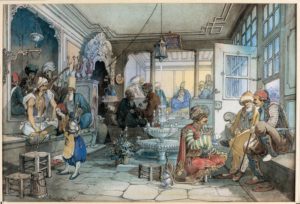
Drawing of a traditional Turkish coffee house in Istanbul.
Coffee houses began to open, which drew people in for communal experiences of conversation, music and games. Because so many people traveled to Mecca, these coffee conversations often included religious discussions. And when they returned home, the popularity of coffee began to press into Europe.
The sipping slope
As coffee spread throughout Europe in the 17th century, local pastors and priests began condemning the drink as “the bitter invention of Satan,” due to its popularity in Islamic communities. Eventually, the controversy found its way to Pope Clement VIII, who decided to try a sip for himself.
Legend has it that Pope Clement expressed his delight while taking a shot at his neighbors, saying, “Why, this Satan’s drink is so delicious that it would be a pity to let the infidels have exclusive use of it. We shall fool Satan by baptizing it and making it a truly Christian beverage.”
“Why, this Satan’s drink is so delicious that it would be a pity to let the infidels have exclusive use of it.”
And thus the Christian slide down the sipping slope began.
Those who realized that the best part of waking up was coffee in their cup, rather than alcohol, tapped into the same energy to stay awake for their day’s work that the pope, the Arab communities, the monks and Kaldi’s goats had known for centuries.
French pressed
At the beginning of the 18th century, the French King Louis XIV grew a coffee plant in his botanical garden. Then in 1723, the French naval officer Gabriel de Clieu pulled some of King Louis’ seeds and pressed on through storms and pirates in order to take the French roast to the Caribbean and the Americas.
With missionaries trying to create religious communities in lands that their countries were conquering and colonizing, coffee plantations and businesses spread and established entire economies.
The Lord’s coffee table
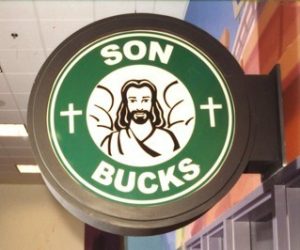
Church coffee shop sign at Faith Church, New Milford, Ct.
Since its earliest days, the church has been a community of neighbors gathering around tables. In Worship in the Early Church, Ralph Martin says the communion gatherings of the church not only included the bread and wine, but also featured the agricultural produce of the community.
It is no surprise, then, that evangelical churches today would tap into the centuries-old tradition of communities gathering together for sacred conversation and celebration while including the agricultural produce of coffee. After all, Hebrews 10:24-25 says, “And let us consider how to provoke one another to love and good deeds, not neglecting to meet together.”
Hebrews 6:12 says, “We desire … that you do not become sluggish.” And as one of my friends noted, “Coffee helps with sluggishness.”
When my wife and I moved to Denver in 2004 to help start a church, one of the first things we began doing was meeting in homes where we had conversation and coffee with our new neighbors. Then once we started gathering on Sunday mornings, we would go to a local bagel shop every Saturday evening to get free bagels for our Sunday morning bagel and coffee table.
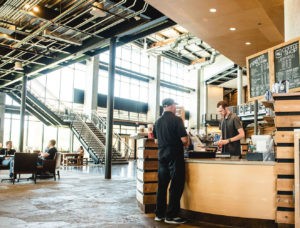
On-campus coffee shop at Watermark Community Church in North Dallas.
Larger churches have begun constructing entire coffee shops in their buildings for use during church gatherings. When we were part of a megachurch in South Carolina, people often would leave quickly after the sermon ended until the coffee shop was added to create a space for people to be together. The coffee shop encouraged people to linger and talk.
More traditional churches often serve coffee at various places throughout their buildings on Sunday mornings, whether in adult classrooms or at hallway coffee bars.
Grace Monroe, a nondenominational church near Atlanta, decided to pursue its mission of “the restoration of all things” by building a coffee shop that would remain open throughout the week. Thus, Bold Springs Coffee has become a gathering place where people from the community can have access to good coffee, fast Wi-Fi, and conversation with members or staff from the church.
Other megachurches have followed this model, often creating seven-day-a-week coffee shops that draw community members to their campuses.
Light and Dark
For more than a thousand years, coffee has drawn people together for conversations about discerning the light within like-minded communities, which included the Islamic coffee houses of Mecca, the Christian coffee houses of Europe, and now evangelical meetings in homes, local coffee shops and even at church.
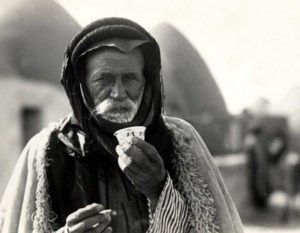
Syrian Bedouin from a beehive village in Aleppo, Syria, sipping the traditional murra (bitter) coffee, 1930 (Wikipedia)
But a dark side to these conversations can happen when a faith community carries an implicit exclusion of those on the outside of the community. In Exclusion and Embrace: A Theological Exploration of Identity, Otherness, and Reconciliation, Miroslav Volf says, “We exclude because we are uncomfortable with anything that blurs accepted boundaries, disturbs our identities, and disarranges our symbolic cultural maps.”
In 1511, Mecca banned coffee because “it was believed to stimulate radical thinking and hanging out.”
Christian pastors in Europe banned coffee due to its Islamic ties.
Murad IV outlawed coffee in Constantinople with penalties ranging from beatings to death by drowning.
I remember being told in my fundamentalist Baptist churches growing up that churches serving coffee during church services were on the slippery slope toward theological liberalism.
In other words, communities love coffee when it brings insiders together, or even when it creates the potential for outsiders to “see the light.” But what happens when the conversations lead toward blurring accepted boundaries? How do outsiders feel when they try to share their perspectives and are dismissed, seen as a threat, or objectified in a religious sales pitch?
What if the on-campus church coffee shop becomes a place of isolating the faith rather than spreading it?
What if the casual coffee conversation becomes a dreaded form of confrontation? For many ex-evangelicals, when a former fellow church member asks them out for coffee, they dread being interrogated and told that they have to return to the theologies that so deeply wounded them.
“What if the casual coffee conversation becomes a dreaded form of confrontation?”
What if invitations to coffee turn into theological traps? For many LGBTQ people, the evangelical coffee shop environment is used to take down their defenses. So they walk into what they believe is a welcoming environment, only to feel tricked into the trauma of exclusionary theology.
And what of those often-overheard Bible studies and evangelistic presentations in public coffee shops? Do they portray the faith as welcoming or as exclusionary?
Holy grounds
Like Kaldi, the book of Exodus tells the story of another shepherd named Moses. As he was leading his flock, he also was drawn to a bush, only this bush didn’t contain berries to consume. It was on fire without being consumed.
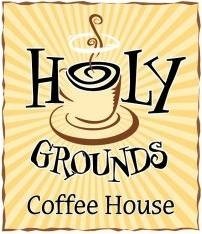
Coffee shop sign at Bethel Life Worship Center, Greenville, Pa.
Soon, Moses found himself in the very presence of God, who told him: “Take off your sandals, for the place where you are standing is holy ground.”
As Moses and God continued in conversation, God told Moses: “I have indeed seen the misery of my people in Egypt. I have heard them crying out because of their slave drivers, and I am concerned about their suffering. So I have come down to rescue them from the hand of the Egyptians and to bring them up out of that land into a good and spacious land, a land flowing with milk and honey.”
The ground of presence with the divine is holy because it is the place where self, neighbor and God commune in a way that dissolves exclusion and heals through embrace. That’s the biblical message that needs to drip down to people of faith.
As you gather together over coffee — whether in a public place or a church-based shop — tap into the long tradition that has brought communities together for centuries. But as you do, use those gatherings to reflect on the nature of your community. Are your conversations merely echo chambers? Are your conversations open to those outside your community in ways that affirm and value them, rather than monetize and objectify them?
When our coffee conversations cultivate communities that see the misery of the those our community has marginalized, that hear the cries and become moved with empathy for the suffering of those we’ve put in bondage, and that work to ensure justice and goodness for them, then we can take of our sandals, sip our coffee and know that we are on holy ground indeed.

Rick Pidcock
Rick Pidcock currently serves as a Clemons Fellow with BNG. He recently completed a master of arts degree in worship from Northern Seminary. He is a stay-at-home father of five kids and produces music under the artist name Provoke Wonder.
Related articles:
Churches, wake up and smell the coffee: communion with a cup of joe? | Opinion by Brett Younger
Free prayer in coffee shops inspires marketplace ministry
Let’s drop the kids at church and go get some coffee | Opinion by George Bullard


